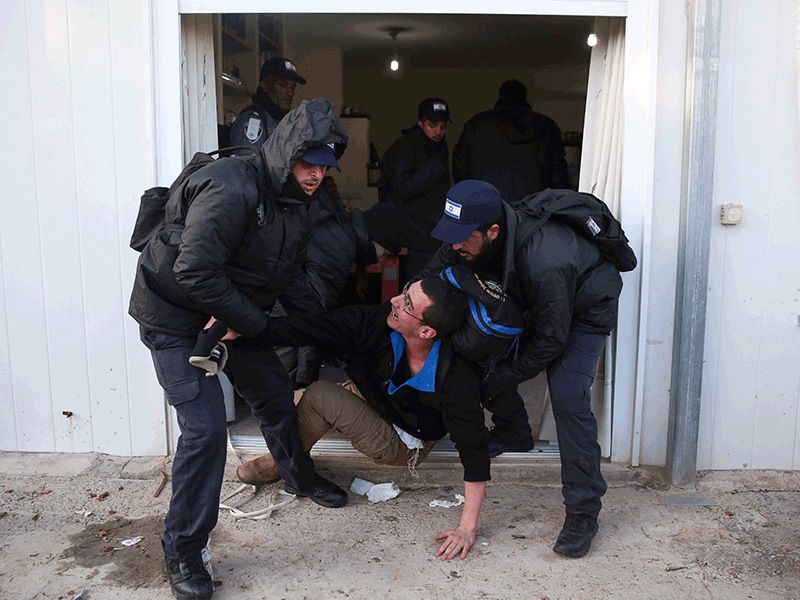On Feb. 1, 2006, exactly 11 years before it would be vacated for good, the Israeli government demolished nine homes ruled to have been illegally built in the West Bank settlement of Amona.
Back then, security forces charged with carrying out the court’s ruling met heavy resistance. Their actions would later be criticized, after a Knesset inquiry found that officers had been excessively brutal during the evacuation. Eight years later, amid mounting criticism that Amona’s residents had stolen their land from private Palestinian owners, Israel’s Supreme Court ordered the settlement’s complete evacuation and dismantling.
The images that streamed from Amona at the beginning of February were enough to make anyone cringe. Scenes of residents being pulled from their homes, as well as a final standoff in the settlement’s synagogue between police and protesters, were reminiscent of the Gaza disengagement 12 years earlier.
READ: KNESSET PASSES BILL TO LEGALIZE SETTLEMENTS ON PRIVATE PALESTINIAN LAND
And while the implementation of former prime minister Ariel Sharon’s Gaza withdrawal, which comprised more than 15 settlements (plus four West Bank settlements that were simultaneously vacated), was far more ambitious than the evacuation of Amona, population 200, the associated trauma – for the residents and their supporters, and for the Jewish state as a whole – was eerily similar. Despite the rapid announcement of a new home for Amona’s residents (on the Geulat Tzion hilltop in the Shiloh region), it will take much more time before they can fully process this upheaval, let alone move on with the process of rebuilding their lives.
But for the settlement project, the disappointment in Amona was tempered by the concurrent announcement of new construction in the West Bank. A week before the evacuation, the Israeli government announced the authorization of 2,500 new homes in West Bank settlements and 550 more in Jerusalem neighbourhoods beyond the Green Line. Then, as the Amona evacuation was underway, Prime Minister Benjamin Netanyahu and Defence Minister Avigdor Liberman authorized a further 3,000 new homes in the West Bank. The next day, the Prime Minister’s Office revealed early plans for a brand new West Bank settlement, the first in more than 25 years.
And there was more. Last week, the Knesset passed the “Regulation Law,” authorizing the appropriation of privately owned Palestinian land – 16 parcels in all – for settlement growth. Not surprisingly, that announcement was met with harsh criticism. The United Nations said the new law crosses a “thick red line” and set a “very dangerous precedent,” while Israel’s attorney general, Avichai Mandelblit, announced he wouldn’t defend the law, which many say is unconstitutional, before the Supreme Court.
READ: ISRAEL’S NEW LAND LAW DEEMED BARRIER TO PEACE BY MANY IN CANADA
Meanwhile, Israeli President Reuven Rivlin, invoking the “A” word that so many Israelis and their supporters fear, said the law makes Israel appear to be an “apartheid state.” Even U.S. President Donald Trump told the Israel Hayom newspaper, “I’m not someone who believes that advancing settlements is good for peace.” And in Ottawa, Foreign Affairs Minister Chrystia Freeland said, “Canada is deeply concerned by the announced expansion of settlements and the retroactive legalization of settlers’ outposts, which are illegal under international law.”
And just like that, as one Jewish settlement closed, new doors were opening throughout the West Bank.
But the question is, for how long?
